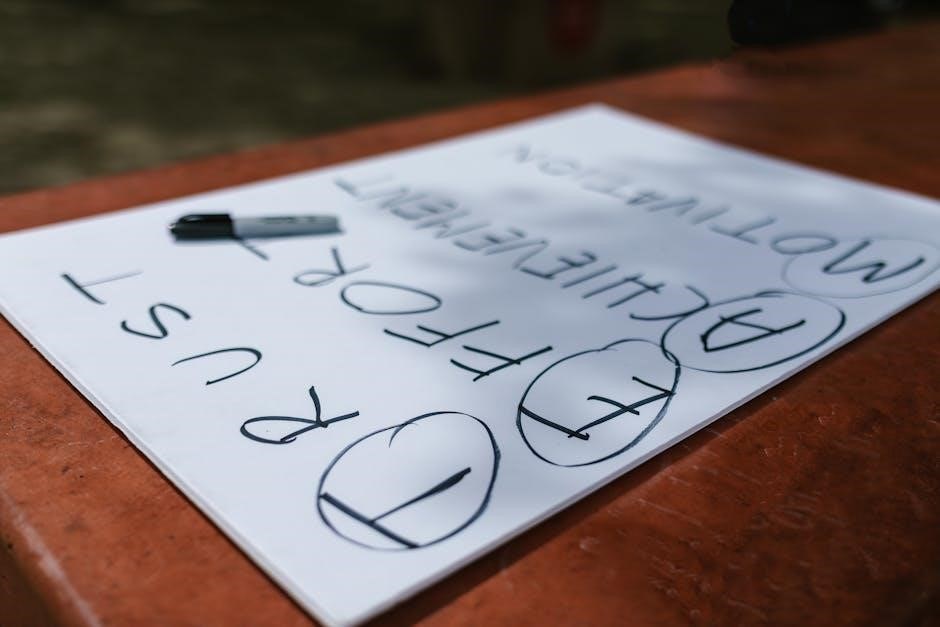The Successful Occupational Therapy Fieldwork Student⁚ A Comprehensive Guide
This guide provides essential strategies for thriving in occupational therapy fieldwork. Mastering essential skills‚ optimizing the student-educator relationship‚ and effectively managing time and stress are crucial for success. Resources and practical tips will empower students to excel.
Understanding Fieldwork Education⁚ A Partnership Approach
Fieldwork education in occupational therapy is a collaborative endeavor‚ a crucial partnership between the student‚ the fieldwork educator‚ and the academic coordinator. The student’s active engagement and commitment to learning are paramount. The fieldwork educator provides direct supervision‚ mentorship‚ and guidance‚ shaping the student’s clinical skills and professional development. They offer real-world experience‚ bridging the gap between theoretical knowledge and practical application. The academic coordinator plays a vital role in overseeing the fieldwork experience‚ ensuring alignment with the curriculum and providing support to both the student and the educator. This three-way partnership fosters a supportive and enriching learning environment‚ maximizing the student’s potential for growth and success. Effective communication‚ mutual respect‚ and shared goals are essential to the success of this collaborative approach. Regular feedback sessions and open dialogue facilitate a smooth and productive fieldwork experience‚ leading to a well-rounded and confident occupational therapy practitioner.
Essential Skills for Success⁚ A Focus on Learning Styles and Professional Behaviors
Success in occupational therapy fieldwork hinges on a blend of technical proficiency and professional demeanor. Students must possess strong observational skills‚ meticulous documentation habits‚ and the ability to synthesize information quickly. Effective communication‚ both verbal and written‚ is crucial for interacting with clients‚ colleagues‚ and supervisors. Adaptability and a willingness to learn from mistakes are also key. Understanding one’s own learning style allows for the development of personalized strategies to maximize knowledge retention and application. Professional behaviors‚ such as punctuality‚ respect‚ and adherence to ethical guidelines‚ are paramount. Time management and organizational skills are essential for juggling multiple tasks and responsibilities. A proactive approach to problem-solving and a commitment to continuous learning are vital for navigating the challenges of fieldwork and transforming theoretical knowledge into practical expertise. Developing these skills ensures a smooth and rewarding fieldwork experience‚ ultimately leading to a successful transition into professional practice.
The Role of the Fieldwork Educator and Academic Coordinator
Fieldwork educators and academic coordinators are pivotal in shaping the student experience. Educators provide direct‚ day-to-day supervision‚ offering guidance‚ feedback‚ and support. Their role extends to evaluating student performance‚ ensuring adherence to ethical standards‚ and fostering a supportive learning environment. Academic coordinators‚ often faculty members‚ play a crucial role in site selection‚ curriculum alignment‚ and addressing student concerns. They act as liaisons between the university and fieldwork sites‚ ensuring the quality and appropriateness of the placements. Effective communication between educators and coordinators is vital for a successful fieldwork experience. Regular meetings and feedback sessions help monitor student progress‚ identify areas needing improvement‚ and facilitate adjustments as needed. This collaborative approach ensures that students receive comprehensive support and mentorship‚ maximizing their learning and professional development throughout their fieldwork journey. Their combined expertise ensures a seamless integration of theory and practice.
Optimizing the Student-Educator Relationship for Maximum Learning
A strong student-educator relationship is the cornerstone of successful fieldwork. Open communication is paramount; regular feedback sessions‚ both formal and informal‚ allow for the timely identification and addressing of challenges. Students should proactively seek clarification on unclear concepts and actively participate in case discussions. Educators should provide constructive criticism‚ focusing on strengths and areas for growth. Mutual respect and trust are essential; students should feel comfortable asking questions and expressing concerns‚ while educators should create a safe and supportive environment. Active listening and clear communication are key; both parties should strive to understand each other’s perspectives and work collaboratively to achieve learning goals. Regularly scheduled meetings‚ including goal-setting sessions‚ provide structure and accountability. This partnership fosters a positive learning environment where students feel empowered to take ownership of their learning and development. The shared commitment to professional growth ensures a mutually rewarding experience‚ leading to enhanced clinical skills and professional confidence.
Practical Tips and Strategies for a Successful Fieldwork Experience
Preparation is key⁚ before fieldwork begins‚ familiarize yourself with the facility’s policies and procedures. Develop a strong organizational system to manage your schedule‚ assignments‚ and client documentation. Proactive communication is vital; establish clear expectations with your educator regarding supervision‚ feedback‚ and learning goals. Seek opportunities to shadow experienced therapists‚ observing their clinical reasoning and interaction with clients. Actively participate in all aspects of client care‚ from initial evaluations to discharge planning. Document your progress thoroughly and accurately‚ adhering to the facility’s guidelines. Seek feedback regularly‚ both from your educator and from peers‚ to identify areas for improvement. Utilize available resources‚ such as textbooks‚ journals‚ and online platforms‚ to enhance your knowledge and skills. Maintain a positive attitude and a willingness to learn from both successes and challenges. Remember that self-care is essential; prioritize your well-being through adequate rest‚ healthy eating‚ and stress-management techniques. By implementing these strategies‚ students can maximize their learning and create a rewarding fieldwork experience.
Utilizing Resources⁚ Planners‚ Manuals‚ and Online Guides
Effective resource utilization is crucial for a successful fieldwork experience. A well-organized planner is essential for scheduling appointments‚ tracking progress‚ and managing tasks. Many students find that combining a calendar with a self-organizer‚ incorporating concepts from the Occupational Therapy Practice Framework‚ proves highly beneficial. This approach allows for efficient scheduling of meetings and other important activities‚ while simultaneously providing a space to record progress towards mastering clinical skills. Fieldwork manuals‚ often provided by the facility or academic institution‚ offer valuable guidance on policies‚ procedures‚ and expectations. These manuals streamline the onboarding process and provide ready access to essential information. Numerous online resources‚ such as professional journals‚ online guides‚ and educational platforms‚ offer continuing education and support. These resources help students stay up-to-date on best practices‚ learn new techniques‚ and access additional learning materials. By effectively utilizing these diverse resources‚ students can enhance their organizational skills‚ improve their understanding of fieldwork requirements‚ and enrich their learning experience.
Navigating the Challenges⁚ Stress Management and Time Management
Occupational therapy fieldwork‚ while rewarding‚ presents significant challenges demanding effective stress and time management; The transition to a new clinical setting‚ coupled with increased responsibilities and the pressure to perform‚ can lead to stress. Implementing stress-reduction techniques‚ such as mindfulness exercises‚ regular breaks‚ and sufficient sleep‚ is crucial for maintaining well-being and preventing burnout. Prioritizing tasks‚ utilizing time-blocking techniques‚ and setting realistic goals are vital for effective time management. Breaking down large tasks into smaller‚ manageable steps can prevent feeling overwhelmed and improve productivity. Learning to delegate when appropriate and seeking support from supervisors or peers can also alleviate stress and improve efficiency. Regular self-reflection‚ identifying stressors and adjusting strategies accordingly‚ is essential for maintaining a healthy work-life balance. Proactive stress and time management techniques empower students to navigate the demands of fieldwork successfully‚ promoting both personal well-being and academic achievement.
Assessing Student Performance⁚ Documentation and Evaluation
Comprehensive documentation and evaluation are cornerstones of successful occupational therapy fieldwork. Meticulous record-keeping‚ including detailed session notes‚ treatment plans‚ and progress reports‚ is essential for demonstrating competence and providing evidence of learning. Accurate documentation not only reflects the student’s clinical skills but also serves as a valuable learning tool‚ facilitating self-reflection and identifying areas for improvement. Regular feedback from fieldwork educators is crucial for guiding student development. Constructive criticism‚ coupled with specific examples of both strengths and weaknesses‚ helps students refine their clinical practice. Self-assessment‚ using tools such as reflective journals or performance checklists‚ encourages self-awareness and enables students to proactively address any identified shortcomings. Formal evaluations‚ typically involving both qualitative and quantitative measures‚ provide a comprehensive assessment of the student’s overall performance‚ identifying areas of excellence and areas needing further development. This multifaceted approach ensures that student progress is accurately tracked and that appropriate support is provided to facilitate successful completion of the fieldwork experience.
Maintaining Momentum⁚ Retention and Successful Application of Knowledge
Successfully navigating the transition from academic learning to professional practice requires strategies for knowledge retention and application. Active recall techniques‚ such as self-testing and practice questions‚ reinforce learned concepts and enhance long-term memory. Connecting theoretical knowledge to practical clinical experiences fosters a deeper understanding and facilitates the application of learned skills in real-world settings. Regular reflection on clinical experiences‚ through journaling or discussions with mentors‚ aids in processing information and identifying areas for improvement. Seeking opportunities for continued learning‚ such as attending workshops or engaging in professional development activities‚ maintains momentum and keeps knowledge current. Building a strong professional network provides access to valuable resources and mentorship‚ supporting long-term success. Establishing effective time management and stress management strategies ensures that students can balance their workload‚ preventing burnout and fostering sustained engagement with their learning. The integration of these techniques empowers occupational therapy students to not only retain knowledge but also to confidently and effectively apply it throughout their professional careers.

